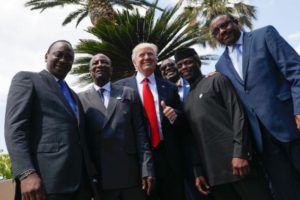- Stay Connected
Trump’s Dangerous Retreat from Africa

An Africanist Donald Trump is not. Unlike his two immediate predecessors, who had signature initiatives on the continent, the U.S. president has shown little interest in Africa and had minimal contact with its leaders. At a lunch he hosted with nine African heads of state on the margins of the U.N. General Assembly in September, he repeatedly referred to the southern African country of Namibia as “Nambia” and startled those in attendance by celebrating the extractive potential of the continent. “I have so many friends going to your countries trying to get rich,” he said. “I congratulate you — they’re spending a lot of money.” Trump made no reference to human rights or strengthening democracy in Africa, usual themes in presidential remarks about the continent.
But the deaths of four American soldiers in Niger and the inclusion of Chad, a key U.S. counterterrorism partner, on the latest iteration of Trump’s travel ban have made Africa increasingly difficult for the administration to ignore. These events have also exposed the administration’s startling lack of expertise when it comes to the continent and its reticence to tap the knowledge of career diplomats and analysts in the executive agencies — missteps that have already cost the administration and which could have additional consequences down the road.
